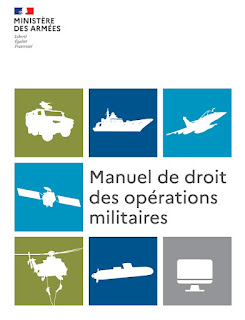French President Emmanuel Macron voiced outrage on Monday over Israeli strikes on a tented camp for displaced Palestinians in Rafah that Gaza officials said killed at least 45 people and demanded an "immediate ceasefire.""These operations must stop. There are no safe areas in Rafah for Palestinian civilians," Macron said on X in English."I call for full respect for international law and an immediate ceasefire."
The destruction, capture, or neutralization of the property must offer, in the circumstances of time and place, a specific military advantage. It is contrary to IHL to launch an attack which offers only indeterminate or possible advantages.
From the principle of distinction comes the prohibition of carrying out indiscriminate attacks. Here are three [examples] of these: attacks which are not directed against a specific military objective, such as example a soldier who fires in all directions without aiming at a specific military objective; attacks in which combat methods or means are used which cannot be directed against a specific military objective, such as for example long-range missiles which cannot be directed at their target with precision; and attacks in which combat methods or means are used whose effects cannot be limited, such as the use of a bomb of particularly high power in relation to the limited military gain expected to destroy a building in an urban area and heavily populated.
The principle of proportionality targets the incidental effects of attacks on civilians and civilian objects. These incidental (collateral) effects can be linked to multiple factors: proximity to a military objective, precision of the weapons used, nature of the military objective targeted, etc. All these factors must be taken into consideration before each attack. Thus, collateral effects on civilians must be taken into account, whether direct or indirect (or cascading), provided that they are predictable.
The proportionality of an attack is assessed on a case-by-case basis, by comparing the foreseeable damage of the attack and the concrete and direct military advantage expected from this attack, in light of the information available at the time of the decision-making. The ICTY held that to determine whether an attack was proportionate, it was necessary to assess whether the person had sufficient knowledge of the situation and whether he judiciously used the information available to him at the time of the attack, so that he could have predicted that the attack would cause excessive losses among the civilian population.
No one in any army in the world, current or future, could possibly have predicted that the target was near a secret weapons cache that would explode and spark a fire that would kill civilians.
|
Or order from your favorite bookseller, using ISBN 9798985708424. Read all about it here! |

|

 Elder of Ziyon
Elder of Ziyon























